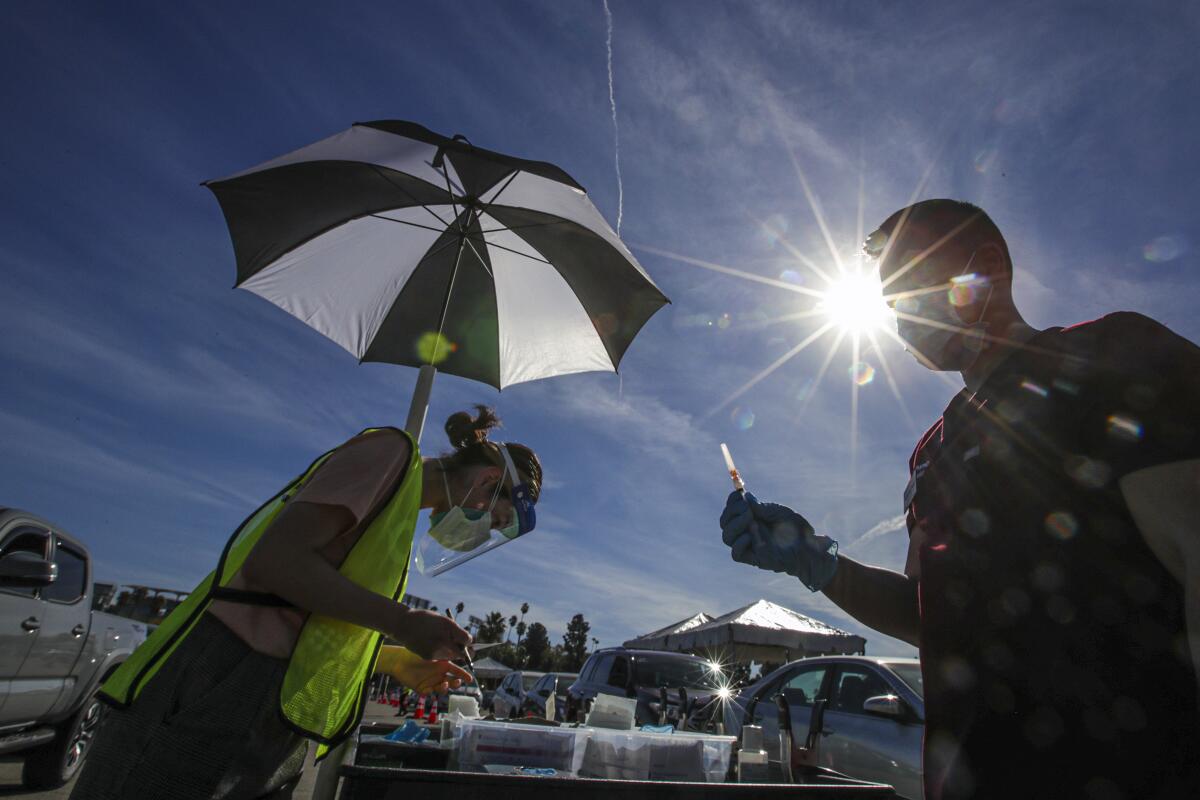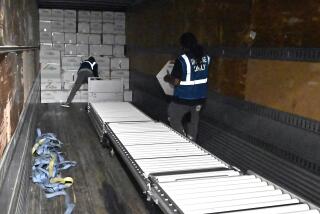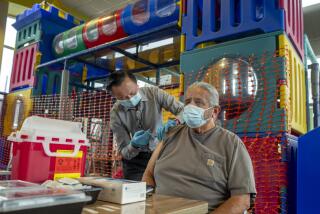Limited supply of COVID-19 vaccine likely to slow rocky rollout for California seniors

As California launches massive COVID-19 vaccination sites to speed up inoculations, concern is growing among public health officials that the supply of doses could soon dry up.
State and local officials Friday complained that the scramble touched off by the federal government’s recommendation to add people 65 and older to vaccine eligibility lists has not been accompanied by an increase in shipments.
That could add to an already confusing and chaotic vaccine rollout, and limit the number of people who can be vaccinated in California, just as the state seems to be gaining ground.
California has administered nearly 1.2 million vaccines, or about 40% of the 3 million doses received, Gov. Gavin Newsom said Friday. That’s a significant increase since Monday, when the state had administered about 783,000 doses, less than one-third of the 2.5 million doses on hand.
But Los Angeles Mayor Eric Garcetti said Friday that some pharmacies that would have received more vaccine shipments this week have to wait a week, “because the national supply simply isn’t coming.” Jeff Gorell, a deputy mayor, said Thursday that the city would receive 46,000 doses for their vaccination sites over the next few days, but that city officials “don’t know what the world looks like after Wednesday.”
“It’s not a problem with the state, it’s not a problem here locally,” Garcetti said. “We simply don’t have the supply coming in.”
U.S. governors said they had been expecting a sharp uptick in vaccine shipments, based on assurances from Health and Human Services Secretary Alex Azar and Operation Warp Speed, the Trump administration initiative to marshal vaccines en masse. Instead, Newsom said Friday, officials “have “reneged on that, or for whatever reason are unable to deliver.”
Trump administration officials had assured U.S. governors that they would soon release doses from a stockpile of vaccines as a way to help states ramp up their vaccination efforts. The Washington Post reported Friday that the stockpile is already depleted, and that states will not receive additional shipments, slowing vaccination programs across the country.
A spokesperson for HHS did not return a request for comment.
President-elect Joe Biden echoed those concerns, criticizing the U.S. vaccine rollout Friday as “a dismal failure thus far.”
A lack of clear information from the White House means state and local officials have been unable to make proper plans because they don’t know how many doses they can expect or when they can expect them, Biden said. He said there were “tens of millions of doses” sitting unused in freezers.
Biden said his goal is for the U.S. to administer 100 million vaccines during his first 100 days in office, including at federally supported community vaccination centers and mobile clinics.
That type of effort will require a massive and reliable flow of doses, and clear communication with local officials who are trying to determine how many appointments to schedule.
Los Angeles County officials estimate that by next week, they will be able to administer more than 40,000 doses per day at vaccination sites that include Dodger Stadium, five mega-sites run by the county — including Six Flags Magic Mountain and the Pomona Fairplex — and a handful of smaller city clinics.
Newsom’s handling of the rollout has drawn criticism too, including his announcement that people 65 or older would be prioritized for vaccinations — creating mass confusion in counties where officials were not ready to administer the shots.
Officials have been inundated with calls from residents 65 and older who want the vaccine, Los Angeles County Supervisor Kathryn Barger said. But the county will not begin the next round of shots until healthcare workers are vaccinated.
The county is not hoarding doses, Barger said, but needs a promise from the state and federal governments that enough doses will arrive to keep vaccination sites running smoothly.
“People are scared,” Barger said. “That’s really the takeaway I’m getting from people who are calling. People are frightened.”
Last week, Newsom sent a letter with governors of seven other states — including New York, Illinois and Michigan — to Azar and the head of Operation Warp Speed demanding that the federal government release doses from a federal stockpile so states could accelerate their vaccinations.
This week during a phone call with Azar and Vice President Mike Pence, governors were told that those doses would soon arrive, Newsom said. Health officials began planning for a surge in supply — which now does not appear to be coming, he said.
The Biden administration has promised to provide more transparency on when doses will arrive, Newsom said, which “helps us with our planning purpose. It allows quicker and more efficient throughput, more capacity.”
Public officials across the U.S. have grown increasingly vocal in their criticisms of the Trump administration, saying the recommendation to vaccinate the elderly would lead to shortages unless more doses are released.
New York City Mayor Bill de Blasio said in a Friday radio interview that the city had vaccinated 125,000 people in four days, but has been receiving a “very paltry” shipment of 100,000 doses per week from the federal government. The city will run out of vaccine next week unless the shipments increase, he said.
One of New York’s largest hospitals, the Mt. Sinai Health System, canceled vaccination appointments this week because they did not have enough doses.
“There is not enough supply of vaccine to keep up with the first appointments, let alone the second appointments,” de Blasio said.
Oregon Gov. Kate Brown said on Twitter that states will not be receiving increased shipments from the national stockpile next week, as previously promised, “because there is no federal reserve of doses.”
Vaccine manufacturers, meanwhile, say production is keeping up. Pfizer stated Friday that they are prepared to release millions of doses each day.
“Pfizer is confident in our ability to deliver 200 million doses of our vaccine to the U.S. government by July 31st,” Pfizer spokeswoman Jerica Pitts said via email.
In Santa Clara County, officials have struggled to determine what the vaccine providers in their own county are doing, or how much they have on hand, county counsel James Williams said.
Some vaccine providers, like CVS, are getting their vaccine shipments directly from the federal government, Williams said. The state distributes some doses to entities operating in multiple counties, including Kaiser hospitals and the Palo Alto Medical Foundation, a major medical group in the Bay Area.
Those entities are responsible for vaccinating the majority of Santa Clara County, but the county doesn’t know exactly what they’re doing, Williams said.
“We have less information than you do,” said Dr. Howard Mandel, president of the L.A. City Health Commission, which acts as an advisory board to the City Council and mayor. A lack of communication coming down from the county is making it difficult for the commission to do its job, and repeated requests for updates and information often go unanswered, he said.
The vaccination pipeline starts at the national level, where federal officials apportion doses for each state, said Dr. Mark Ghaly, California’s Health and Human Services secretary. Then states allocate doses to counties, local health authorities and other entities like hospitals and prison systems— and then doses are allocated to providers like pharmacies and clinics.
Garcetti and three dozen other big-city mayors are pushing for less red tape and more local control. In a letter this week, the mayors urged Biden to release doses directly to cities, saying: “There is a need to be nimble and fill gaps that are unique to each local area.”
Vaccine distributors said they’re ready to deliver more doses, but that they are beholden to government rules for allocation.
Kaiser Permanente of Southern California has been “preparing for the expansion of eligibility” to include people 65 and older, but making that happen “depends on getting access to adequate supplies of vaccine, which we understand is coming,” said Dr. Nancy Gin, regional director of quality and clinical analysis.
The Albertsons supermarket chain, which will be administering vaccines at its retail pharmacies, said it is training more than 500 pharmacy technicians to assist with inoculations, and that vaccines are “moving out the door” as soon as they come in.
“The regulating factor really is the number of vaccines being allocated to us,” Albertsons pharmacy manager Willem Henning said. “If we received more vaccines, we could probably do several hundred more each week.”
Times staff writers Jaclyn Cosgrove and Colleen Shalby contributed to this report.
More to Read
Sign up for Essential California
The most important California stories and recommendations in your inbox every morning.
You may occasionally receive promotional content from the Los Angeles Times.













